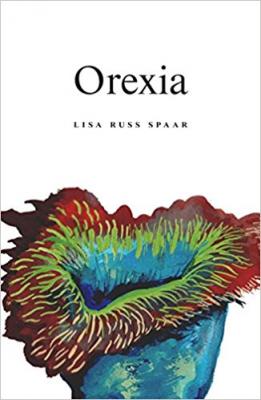Lisa Russ Spaar’s seventh collection Orexia creates the aura of a world bound up in unrelieved tension so exquisitely balanced that it is beautiful. If the poem can be made, it may embody the balance as a sort of proof. Balance isn’t resolution. Uncertainty has a certain weight, so does a vision; the blunt or stunning facts of the seen have a counterweight.
OREXIC HOUR
My body, made to be entered
& exited. Almost wrote “edited.”
Eaten. Odd to be so direct.
Who cares that the maples blistered
with renewal today, at last,
despite shackles of snow,
not for me, not for you,
obeying an instinct akin to human,
but not. Still freighted
by the gadget of a self, I admit
I care. Is it my appetite for this violent
flux – crocus mons afloat beneath oaks,
stamen, odor, bulb-aroused mouth –
that, against effacement, I invent?
The body entered, the maple shackled. The body is like and unlike the maple. The maple is akin to human, but the human self is a gadget. Caring and not caring. The woman “eaten,” the crocus with “bulb-aroused mouth.” Judgment here is intrinsic in the manifesting of linkages – in their making and in the assessment of their making. The moment of the poem is both intended and compulsive. Obeying and questioning instinct. The final element in the achievement of balance is supplied by the reader: a response to the question at the end. The shape of the question incarnates its hesitation and doubt — shaped as an interruption, a delay, its gut burst open by the “violent flux” of crocus renewal.
 The many titled “hours” in Orexia are both passings and stoppages of time. There is the run-time of the poem and also the eternity of the moment. The “hour” poems are accompanied by several “temple” poems – and both remind me of a remark made by photographer Robert Adams who said of his friend, “Frank Gohlke’s regard for the world is shared, it seems to me, as comfortably as one would a hymnal.” About this life, she writes in “Temple Gaudete,” “Simple to say: there is a gash, // then balm.” The final lines: “O salve & knife. Too simple to say / we begin as mouths, angry swack, // lungs flooded with a blue foreseeing. / Story that can save us only through the body.” Her temples are places for rather strict observances, not consoling observations.
The many titled “hours” in Orexia are both passings and stoppages of time. There is the run-time of the poem and also the eternity of the moment. The “hour” poems are accompanied by several “temple” poems – and both remind me of a remark made by photographer Robert Adams who said of his friend, “Frank Gohlke’s regard for the world is shared, it seems to me, as comfortably as one would a hymnal.” About this life, she writes in “Temple Gaudete,” “Simple to say: there is a gash, // then balm.” The final lines: “O salve & knife. Too simple to say / we begin as mouths, angry swack, // lungs flooded with a blue foreseeing. / Story that can save us only through the body.” Her temples are places for rather strict observances, not consoling observations.
Spaar’s work leaves me vulnerable to all my speculations about the substance and spirit of the world – and to asking why, when I try to make a poem, the words may seem rightly simple, and then too simple. Her poems expose the binding nature of their own freely expressive project. There is exultation, and at a certain moment, the assessing impulse to stifle it: the wariness that the defenseless wish for meaning may be overthrown by the harsh will to meaning.
Bertolt Brecht famously said, “One cannot write poems about trees when the forest is full of police.” Cannot, not should not. Anyway, he wrote “The Plum Tree” in 1934 just as the Nazi SS was enforcing a police state and terrorizing the regime’s enemies. In 2017, I carried Orexia in my messenger bag as a resonant reminder that a basic urgency of poetry is the attempt to put ourselves into an accord with the mystery of the actual. “Orexic Hour” illuminates (or enshadows) the graceful strain of the effort – the melancholy of an incapacity to overcome oneself and the flesh-tingling capacity to make something equipoised out of the lack.
THE WHALES
Belied, be-laired, in sleep’s massacred vista
of blood that is the sea within,
like a god, entranced from above,
I felt the whales before I saw them, gorgeous
foetal continents, lost, glistering, parental,
mare-blue beneath sediments of stellar silks,
planktal glass, moving the wrong way
up a narrowing, inland stream.
With all my blindness, I wept
to save them, mysticeti, their kimono lobes
pharyngeal bells, and lonely spume,
their homesick crying like a scarf of fox grapes
reaching sailors still hundreds of miles
from land. They placental. They
in four-chambered beyonding.
And my own heart, beached – erupting
into hollow room, to closet door,
to clock face, where I failed
and failed again to help them
over the rhapsodic rasures of this world.
Spaar is helpless to do anything other than to struggle through sound. She has arrived at a sonic mode that, as Louise Bogan would say, is the last resort. Sound in poetry is what draws us away from dire circumstance. Sound furnishes an ambit: the poet and reader discover the means to think around and within the material rather than merely through it. Sound embodies and emits a wish for the dissolution of alienation. In “The Whales,” sound facilitates an immoderate, Leviathan-sized trope, a long gaze of bracing wonderment. How hopelessly fearless one must be to make a poem like this, willing to risk the dull, biased, rejecting ear of whatever self-curates itself as “contemporary.” The emphasis on sound also underscores the arbitrary character of signs – every word at our disposal is a kind of affectation provoking us to continuously remake and redeploy words in ways that are intelligible to other humans.
 Hopkins and Dickinson … Spaar’s antecedents have been noted before. Dickinson suggested that the terms used by pastor and apostate are not so dissimilar. For Dickinson, poetry was revelation (small “r”) and at the same time a tumble into trespass and breakage – just as ravishment and displacement unsettled the first saints in the wilderness who had arrived via their god’s grace alone. The history is not required to engage with and be moved by the poetry of Lisa Russ Spaar. But I mention it because I stuck with her through 2017 as a poet of tradition and the long view. In a year of outrage, disbelief and dissent, the queasy-making presence of undead tyrants mocked the fragility of a decent life. Her whales, “moving the wrong way,” endangered, grown beyond my pettiness into the numinous, are my totems of this troubled moment. I sought and found assurance that we all hadn’t been shoved off the balance beam. I pulled her books from my shelf and read them once again, and prepared myself to speak.
Hopkins and Dickinson … Spaar’s antecedents have been noted before. Dickinson suggested that the terms used by pastor and apostate are not so dissimilar. For Dickinson, poetry was revelation (small “r”) and at the same time a tumble into trespass and breakage – just as ravishment and displacement unsettled the first saints in the wilderness who had arrived via their god’s grace alone. The history is not required to engage with and be moved by the poetry of Lisa Russ Spaar. But I mention it because I stuck with her through 2017 as a poet of tradition and the long view. In a year of outrage, disbelief and dissent, the queasy-making presence of undead tyrants mocked the fragility of a decent life. Her whales, “moving the wrong way,” endangered, grown beyond my pettiness into the numinous, are my totems of this troubled moment. I sought and found assurance that we all hadn’t been shoved off the balance beam. I pulled her books from my shelf and read them once again, and prepared myself to speak.
[Published by Persea Books on February 28, 2017. 96 pages, $25.95 hardcover]